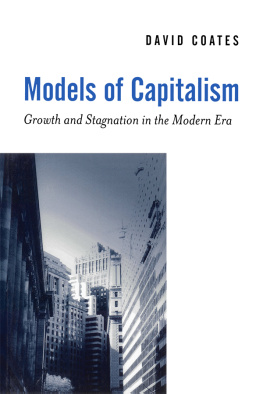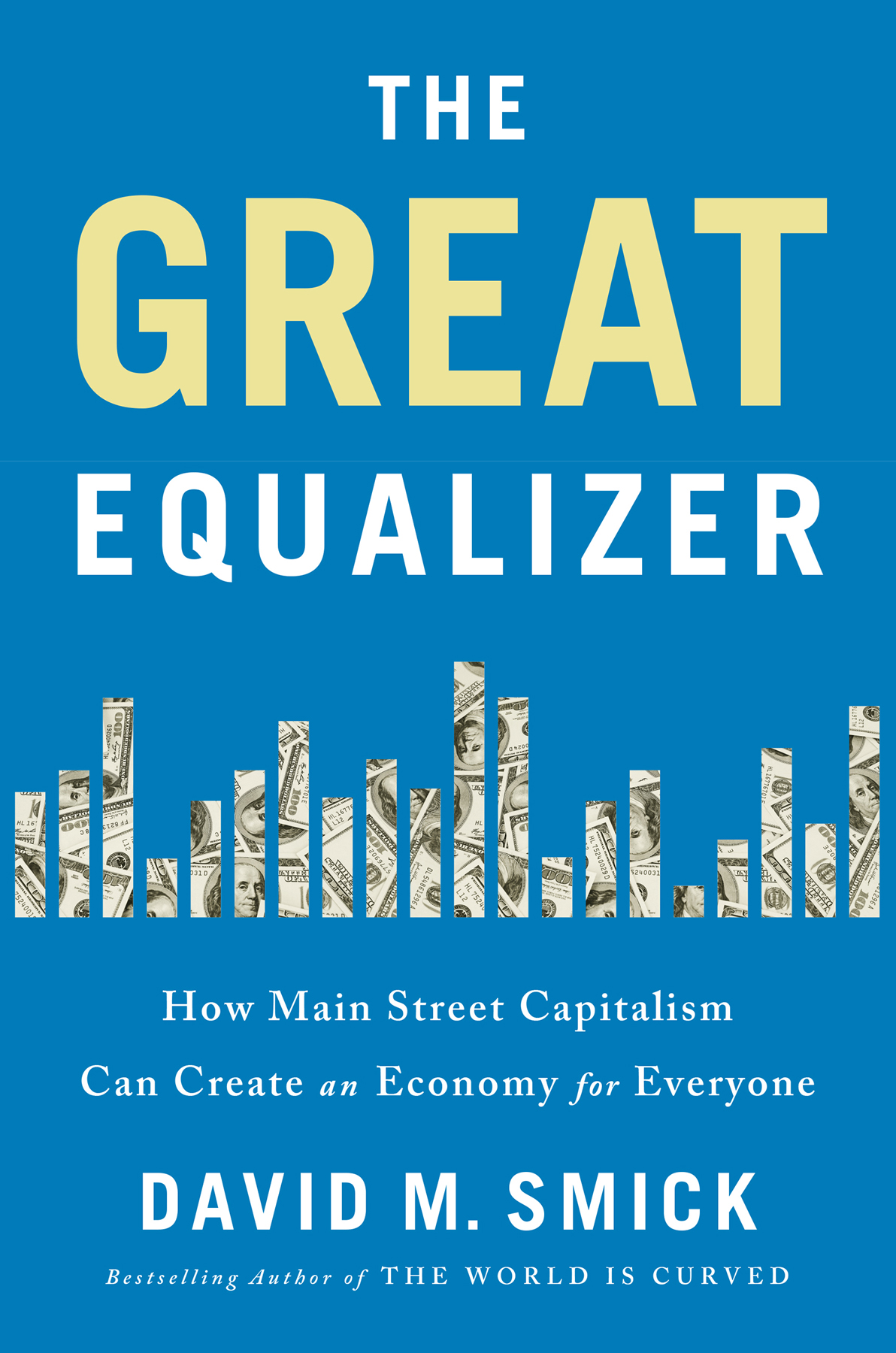Copyright 2017 by David M. Smick
Published in the United States by PublicAffairs TM , an imprint of Perseus Books, LLC, a subsidiary of Hachette Book Group, Inc.
All rights reserved.
No part of this book may be reproduced in any manner whatsoever without written permission except in the case of brief quotations embodied in critical articles and reviews. For information, address PublicAffairs, 250 West 57th Street, 15th Floor, New York, NY 10107.
PublicAffairs books are available at special discounts for bulk purchases in the U.S. by corporations, institutions, and other organizations. For more information, please contact the Special Markets Department at Perseus Books, 2300 Chestnut Street, Suite 200, Philadelphia, PA 19103; call (800) 810-4145, ext. 5000; or e-mail special.markets@perseusbooks.com.
Book Design by Amy Quinn
Library of Congress Cataloging-in-Publication Data
Names: Smick, David M., author.
Title: The great equalizer : how main street capitalism can create an economy
for everyone / David M. Smick.
Description: First Edition. | New York : PublicAffairs, 2017.
Identifiers: LCCN 2016037061 (print) | LCCN 2016049687 (ebook) | ISBN
9781610397841 (hardback) | ISBN 9781610397858 (ebook)
Subjects: LCSH: United StatesEconomic policy21st century. | Creative
ability in businessUnited States. | Small businessUnited States. |
Economic developmentUnited States. | BISAC: BUSINESS & ECONOMICS /
Economic Conditions. | POLITICAL SCIENCE / Economic Conditions. | BUSINESS
& ECONOMICS / Development / Economic Development.
Classification: LCC HC106.84 S65 2017 (print) | LCC HC106.84 (ebook) | DDC
338.973dc23
LC record available at https://lccn.loc.gov/2016037061
First Edition
ISBN: 978-1-610-39785-8
E3-20161203-JV-NF
T his is a unique moment in American history. Our president can shift peoples expectations about the future to positive goals and actions. The choice is between being an ideological placeholder or becoming a truly transformational president. In a counterintuitive way, todays public anger and disillusionment over lack of economic opportunity have produced a rare chance to achieve positive change. The publics message to their Washington policymakers: We are tired of economic mediocrity at home and terrified of a dangerous world. We crave a healthier, more robust economy. We want constructive change. We dont care how you get there. Be creative. Be pragmatic. Try different things. Cut bipartisan deals. Just get there! We want an economic environment of bottom-up dynamism. When all is said and done, economic growth is everything.
The Great Equalizer describes the new mindset that can achieve a better economy for everyone. It is a call for a set of new paradigms that inspire and empower average Americans to reboot their economy. It is a manifesto that argues with a new kind of economic policy of Main Street Capitalism, Americas best days are still to come.
To be sure, many experts have concluded that Americas best days are behind us, that mediocre long-term economic growth is baked in the cake, and that politically, socially, and racially, the United States will continue to tear itself apart. These experts are wrong.
True, the economy faces stiff headwinds. The policy tools of macroeconomics have failed to achieve historic levels of economic performance. The central bankers have slashed interest rates and flooded the economy with liquidity. The economy has underperformed anyway. As a result, working- and middle-class families can feel the American Dream slipping away. For nearly two decades, their incomes have flatlined. Average folk are desperate. They yearn for a dynamic jobs-producing economy that works for everyone. They know in their gut America needs a new economic approach.
Americans feel besieged precisely because in recent decades, a Corporate Capitalism of top-down mismanagement and backroom deal-making has smothered their innovative spirit. Government and central bank policy now favors the big, the corporate, and the status quo at the expense of the small, the young, the new, the inventive, and the entrepreneurial. It favors Wall Street over Main Street. Because the economic system is compromised, people can feel it in their bones that their childrens future is being frittered away.
In response, I envision a vibrant Main Street Capitalism of mass small business startups and bottom-up innovation, all unfolding on a level playing field. Main Street Capitalism is the Great Equalizer. It offers a climate of dynamism where every man or woman is a potential founder of a business startup. Women already start firms at twice the rate of men (based on 2014 data). Dramatic advancement by female entrepreneurs could become Americas economic secret weapon. Just as important, Main Street Capitalism especially empowers those at the bottom rungs of the economic ladder.
As Ill show, the problem with todays economy is not a lack of monetary liquidity but a lack of the liquidity of confidence. People are terrified of the future. Investors are holding back. Innovators are starting firms at less than half the rate they did two decades ago.
There are reasons why Americas economic dreamers and discoverers have become risk averse. The economic system is rigged. In the fight between David and Goliath, Goliath always wins. And in Washington, D.C., a stifling partisanship has meant nothing ever gets done to fix things. Meanwhile, our infrastructure is crumbling. I argue that the political and legislative tactics of two past presidents, Republican Ronald Reagan and Democrat Bill Clinton, can offer a useful guide to better policymaking.
Today, the world is a terrifying place of massive debt, currency wars, dubious asset prices, and excess supply capacity, while ISIS rears its ugly head all too often. The new information economy is replacing the old, familiar, brick-and-mortar one of manufacturing. Technological change is coming at people so fast they are overwhelmed. Can technological innovation be made to benefit everyone, and not just a select few in Silicon Valley and their investors on Wall Street?
I contend that despite such daunting challenges, people are not going to give up on the American Dream without a fight. Thankfully, innovative dreaming and discovering have always been in Americas DNA. The United States has been a land of innovative daring. That is why the American economy has traditionally been a massive, high-growth, jobs-producing machine, a hothouse of commercially attractive creativity. The United States still has many advantages. The building blocks are still in place to achieve higher levels of economic success. Today technology is sometimes feared, but actually innovative advancements in information and other technologies can produce a powerful bottom-up growth phenomenon. Because people are more connected, great ideas are more easily found and shared. All human knowledge is at everyones fingertips, and essentially is free. The cost of reaching customers has never been cheaper. So The Great Equalizer is ultimately an optimistic book about rebuilding an awesome economic growth engine that is beyond the economists ability to model. To show the way, I offer Main Street Capitalisms 14-Point Plan of bipartisan reforms that can help unleash Americas creativity and confidence.
Ultimately, economies are more than statistical measurements of supply and demand, economic output, balance-of-payments deficits, and rates of return on capital. As Ill show, economies are peopletheir hopes, fears, dreams, and expectations. Economies entail what the English economist John Maynard Keynes in 1936 called the ebb and flow of animal spirits. Economies are flesh and blood. And thats the good news.



